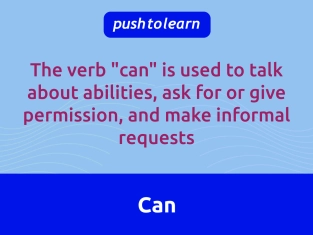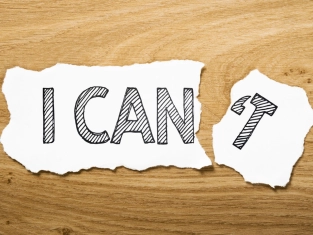by PushtoLearn
Can, Could, Be Able to
Table of Contents
Can, Could, Be Able to Exercises
These exercises focus on Can, Could and Be Able to express ability and possibility.
The Difference Between "Can," "Could," and "Be Able To"
|
Form |
Use |
Example |
|
Can |
Present or general ability, permission, or possibility |
She can swim very well. (Ability) |
|
Could |
Past ability, polite requests, or possibility |
When I was five, I could ride a bike. (Past ability) |
|
Be able to |
All tenses; formal situations |
He will be able to help tomorrow. (Future ability) |

How to Use "Can"
✅ "Can" for Present Ability
-
I can speak three languages.
-
She can run 5 km without stopping.
✅ "Can" for Possibility
-
It can get very cold in winter.
-
This road can be dangerous at night.
✅ "Can" for Permission
-
Can I leave early today?
-
You can take a break now.
🚨 Common Mistake:
❌ I can to swim. (Incorrect)
✅ I can swim. (Correct – "can" is followed by the base verb)
How to Use "Could"
✅ "Could" for Past Ability
-
When I was a child, I could run very fast.
-
She could play the piano when she was five.
✅ "Could" for Polite Requests
-
Could you help me, please?
-
Could I borrow your pen?
✅ "Could" for Possibility
-
It could rain later, so take an umbrella.
-
That could be the answer to our problem.
🚨 Common Mistake:
❌ I could to play the guitar. (Incorrect)
✅ I could play the guitar. (Correct – "could" is followed by the base verb)
How to Use "Be Able To"
✅ "Be Able To" for Present and Future Ability
-
She is able to solve complex math problems.
-
He will be able to join us next week.
✅ "Be Able To" for Past Ability (Specific Situations)
-
I was able to fix my car yesterday.
-
She was able to escape from the burning building.
🚨 "Be able to" is often used instead of "can" in tenses where "can" isn’t possible.
|
Tense |
"Can" |
"Be able to" |
|
Present |
She can swim. |
She is able to swim. |
|
Past |
She could swim. |
She was able to swim. |
|
Future |
❌ (Not possible) |
She will be able to swim. |
🚨 Common Mistake:
❌ I will can help you tomorrow. (Incorrect)
✅ I will be able to help you tomorrow. (Correct – "be able to" is needed for future ability)
Common Errors and How to Fix Them
|
Mistake |
Correction |
Why? |
|
❌ I can to dance. |
✅ I can dance. |
"Can" is followed by the base verb. |
|
❌ I will can go. |
✅ I will be able to go. |
"Can" cannot be used in future tense. |
|
❌ I was able to run fast when I was a child. |
✅ I could run fast when I was a child. |
"Could" is better for general past ability. |
FAQ: "Can," "Could," and "Be Able To"
Can I use "can" in the past?
No, use "could" or "was/were able to" instead.
-
I could swim when I was 5. (General past ability)
-
I was able to find my keys. (Specific past situation)
Can "could" be used for future ability?
No, use "will be able to" for future ability.
❌ I could go tomorrow. (Incorrect)
✅ I will be able to go tomorrow. (Correct)
What is the difference between "could" and "was able to" in the past?
-
"Could" is for general ability (I could swim as a child).
-
"Was able to" is for a specific situation (I was able to swim across the lake yesterday).
Can I use "be able to" instead of "can"?
Yes, but "be able to" sounds more formal.
-
She can speak Spanish. (Natural)
-
She is able to speak Spanish. (More formal)
Which is more polite: "Can you" or "Could you"?
"Could you" is more polite.
-
Can you help me? (Casual)
-
Could you help me? (More polite)

